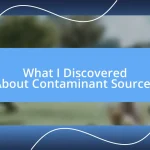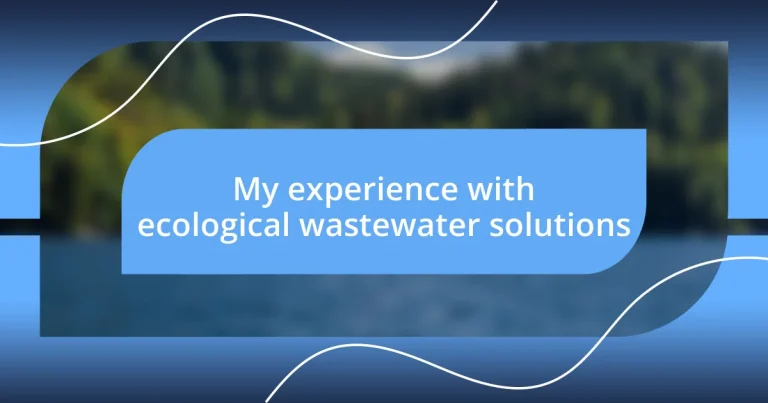Key takeaways:
- The author emphasizes the interconnectedness of ecosystems and the importance of adopting ecological solutions for sustainable wastewater management, highlighting community-led initiatives like constructed wetlands.
- Challenges faced include overcoming community skepticism, navigating regulatory hurdles, and initially struggling with technical complexities, which underscored the need for trust and effective communication.
- Key benefits of ecological wastewater solutions include fostering community engagement, reducing costs through natural systems, and enhancing local landscapes, potentially transforming wastewater from a challenge into a resource.
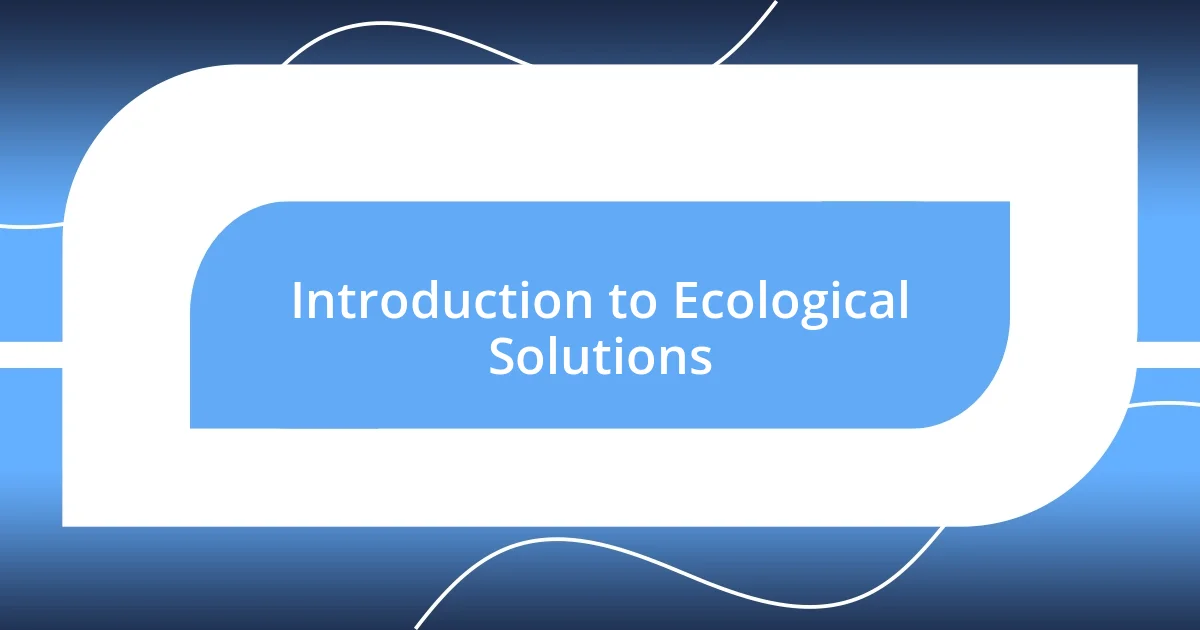
Introduction to Ecological Solutions
Ecological solutions encompass a wide range of approaches that aim to mitigate environmental impact while effectively managing resources. I still remember the first time I explored a natural wastewater treatment system; the way plants and microorganisms worked in harmony inspired me deeply. It made me realize that nature has its methods of recycling nutrients and purifying water—something we can learn from if we open our minds to it.
But what does it really mean to embrace an ecological mindset? I often find myself reflecting on the balance between modern conveniences and sustainable practices. For instance, I’ve witnessed how community-led initiatives can bring about significant change, like constructing green roofs to manage stormwater. Have you considered how the choices we make daily impact our environment?
As we delve deeper into ecological solutions, it’s essential to understand not just their mechanics, but the philosophy behind them. My experiences engaging with local conservation groups highlighted how interconnected our ecosystems are and the responsibilities we bear as stewards of the planet. Each decision we make can either support or hinder the delicate balance of the natural world.
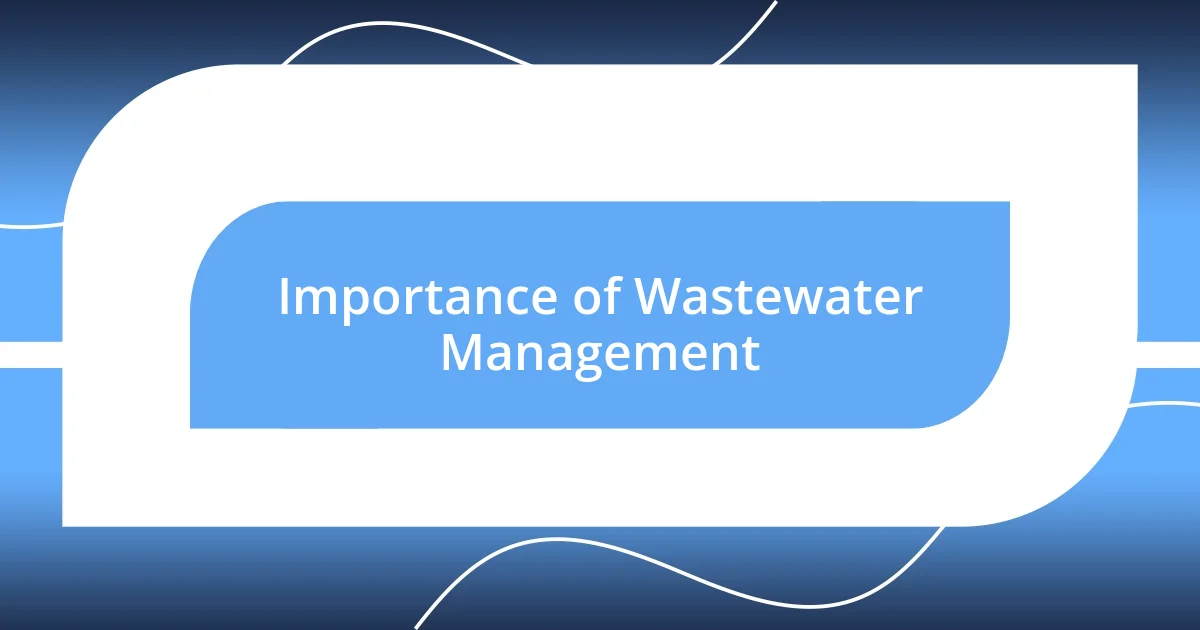
Importance of Wastewater Management
Wastewater management is critical for maintaining ecological balance. I’ve seen how ineffective handling of wastewater can lead to dire consequences, like the fish kill in a nearby river caused by untreated sewage. It struck me deeply; the lifeblood of our ecosystem was being tainted, reminding me of the urgent need for responsible management.
Moreover, effective wastewater treatment can significantly enhance public health. When I visited a rural community with inadequate systems, the prevalence of waterborne diseases was alarming. It was heartbreaking to witness families affected by preventable illnesses. By adopting sustainable practices, we can protect communities and ensure safe access to clean water.
Investments in wastewater management often yield significant economic benefits too. I recall attending a workshop where local leaders outlined how proper treatment solutions led to job creation in their area. The pride in their voices was palpable, showcasing the connection between sustainable practices and community resilience. It’s inspiring to know that what we do today can shape a healthier tomorrow.
| Aspect | Importance |
|---|---|
| Environmental Protection | Prevents pollution and supports ecological balance. |
| Public Health | Reduces waterborne diseases and promotes safer communities. |
| Economic Benefits | Creates jobs and boosts local economies through sustainable practices. |
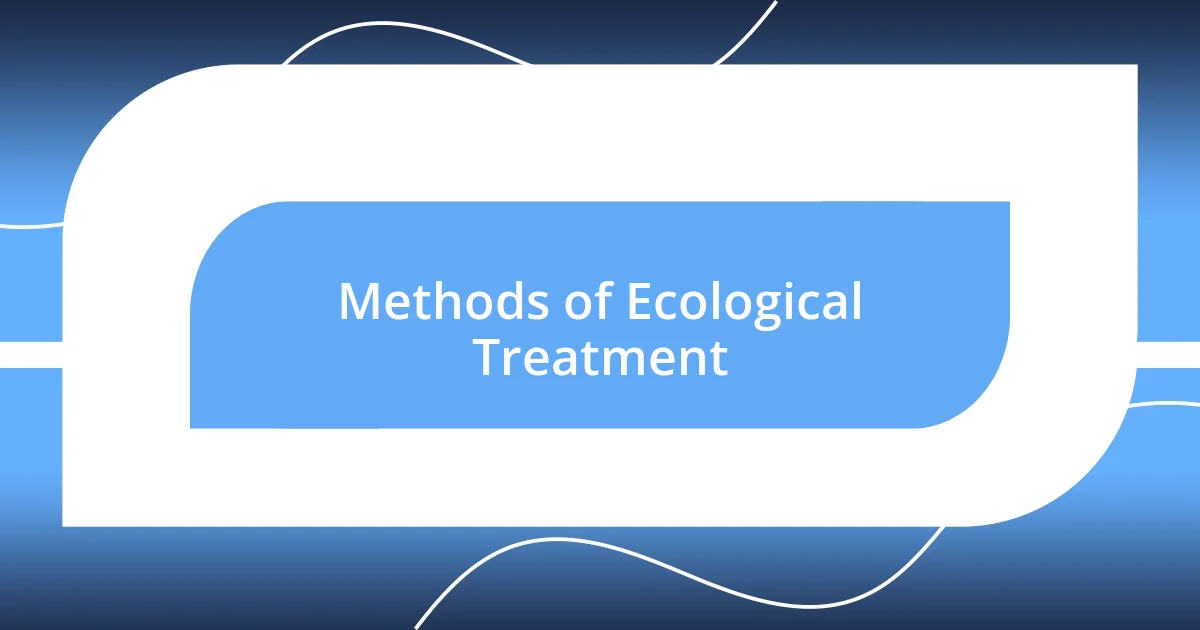
Methods of Ecological Treatment
The methods of ecological treatment vary widely, each with its unique charm and effectiveness. During a field trip to a constructed wetland, I was captivated by the sight of plants thriving in water that was once seen as waste. It was fascinating to see how the combination of microorganisms and aquatic plants played a crucial role in breaking down pollutants. This living system not only cleansed the water but also provided a habitat for wildlife. This interconnectedness made me appreciate how we can repurpose something viewed as a burden into a vital resource.
Here are some common methods of ecological treatment:
- Constructed Wetlands: Mimics natural wetlands to treat wastewater through filtration, sedimentation, and uptake by plants.
- Biofiltration: Uses microorganisms found in soil or other media to break down contaminants, often seen in systems like composting toilets.
- Aerobic Treatment Units (ATUs): Introduces oxygen into the wastewater to promote microbial activity that degrades organic matter.
- Vegetated Swales: Shallow, vegetated channels that manage stormwater runoff while filtering pollutants through plant roots and soil.
Exploring these methods firsthand, I felt a deep connection to nature’s ability to heal itself. Witnessing the success of these systems added depth to my understanding of how effective ecological treatment can change our relationship with wastewater. It illustrates a path forward that respects both our environment and our communities.
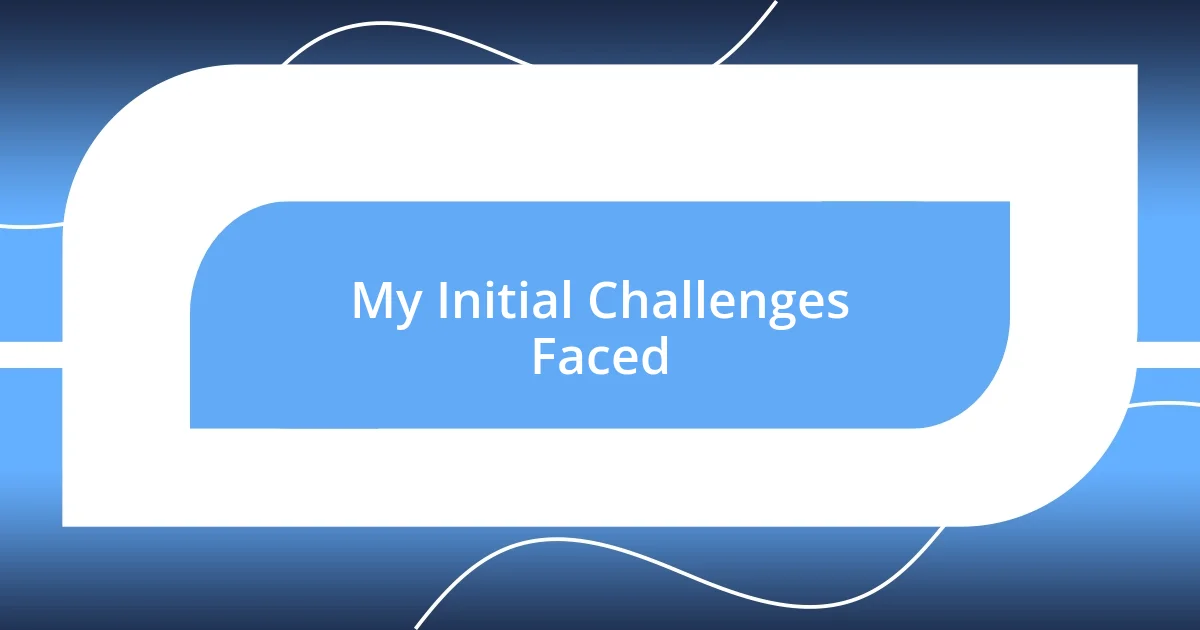
My Initial Challenges Faced
When I first delved into ecological wastewater solutions, I was overwhelmed by the complexity of existing systems. I vividly remember attending my first community meeting, where the technical jargon flew over my head like a foreign language. I felt a mix of frustration and confusion—how could I contribute to a solution if I didn’t understand the very basics? This experience taught me the importance of breaking things down into manageable pieces, a lesson that still guides me today.
Another challenge I faced was the skepticism from some community members who were resistant to change. I remember one heated discussion where an older gentleman voiced concerns about the reliability of new methods. It struck me how fear of the unknown often holds people back. I realized that building trust would be essential, and sharing success stories from other communities became my go-to strategy. Wasn’t it crucial to show tangible benefits to gain their confidence?
Navigating the regulatory landscape was yet another hurdle. I found myself juggling permits, approvals, and endless paperwork, feeling like I was lost in a bureaucratic maze. One evening, after a particularly exhausting day filled with rejections, I sat down with a cup of tea and thought about the bigger picture. I had to remind myself: these challenges were stepping stones leading to lasting change. What seemed like setbacks were ultimately paving the way for a resilient wastewater management solution.
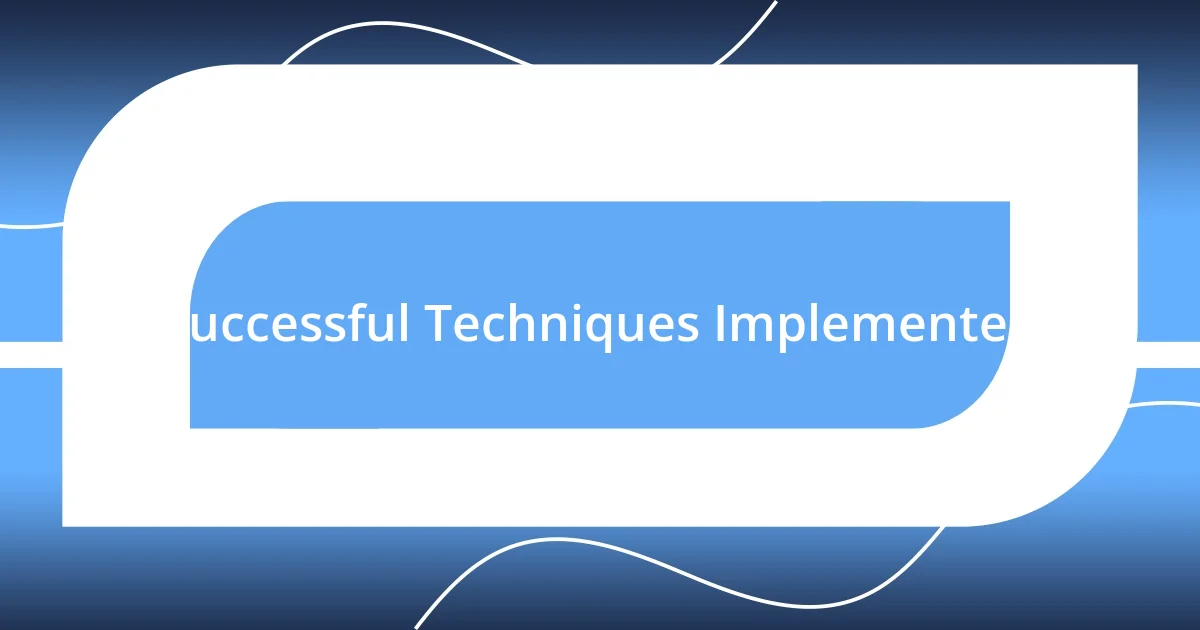
Successful Techniques Implemented
The implementation of constructed wetlands proved particularly effective in our community. I remember the day we first integrated it into our wastewater management plan—it was exciting to watch as we transformed a patch of land into a thriving ecosystem. The community members gathered to witness how the wetland absorbed runoff, filtering pollutants while also enhancing our local biodiversity. I still smile at the sight of kids playing nearby, curious about the frogs and dragonflies now inhabiting what was once a neglected space.
Another standout technique was biofiltration. I recall setting up a demo unit in my backyard, where I could easily monitor, maintain, and demonstrate its efficacy. Little did I know it would become a talking point at block parties! Neighbors were fascinated by how a simple arrangement of soil and plants could effectively treat our household wastewater. It hit me then that when technology and nature intersect, they create tangible solutions that everyone can rally around.
Finally, I was truly impressed by the aerobic treatment units (ATUs). The day we installed one, I felt a mix of anticipation and skepticism—could this really work? As weeks passed, I observed the unit in action and saw firsthand the visible reduction in waste. It amazed me how a bit of oxygen could inspire such vibrant microbial life, turning our wastewater into something much more manageable. This hands-on experience reaffirmed my belief that innovative technologies can thrive alongside ecological principles, ultimately leading to a more harmonious relationship with our environment.
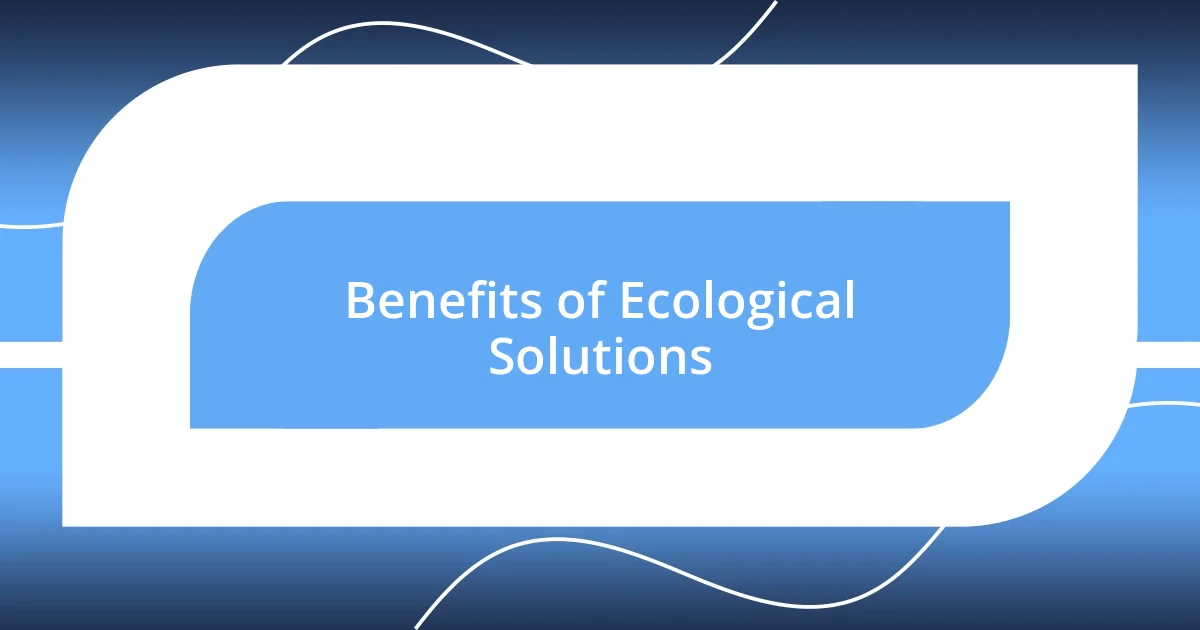
Benefits of Ecological Solutions
One of the standout benefits of ecological solutions, from my perspective, is how they foster community engagement. I recall a community workshop where I shared the idea of using reed beds for wastewater treatment. The excitement in the air was palpable, as we brainstormed how we could turn that initial skepticism into a community project. Seeing folks light up with the idea that we could work together on something so beneficial was a profound moment for me—ecological solutions truly promote a sense of ownership and pride among community members.
In my experience, ecological options offer not just environmental perks but also financial savings. When we switched to using natural filtration systems, I noticed a dip in our maintenance costs. It might sound surprising, but embracing a bit of nature resulted in fewer repairs and lower operational expenses. I often think back to that first year after implementation; my neighbors were left clamoring for a piece of that cost-effective wisdom. Who wouldn’t want to save some money while also helping the planet?
Moreover, the aesthetic and ecological improvements have been striking. I vividly recall the transformation of our community’s landscape after we integrated green infrastructure. What was once a dull, lifeless area is now bustling with vibrant plants and happy wildlife. It struck me how the rejuvenation of our local ecosystem encouraged more people to spend time outdoors. Isn’t it amazing how addressing wastewater issues can improve not only our environment but also our quality of life?
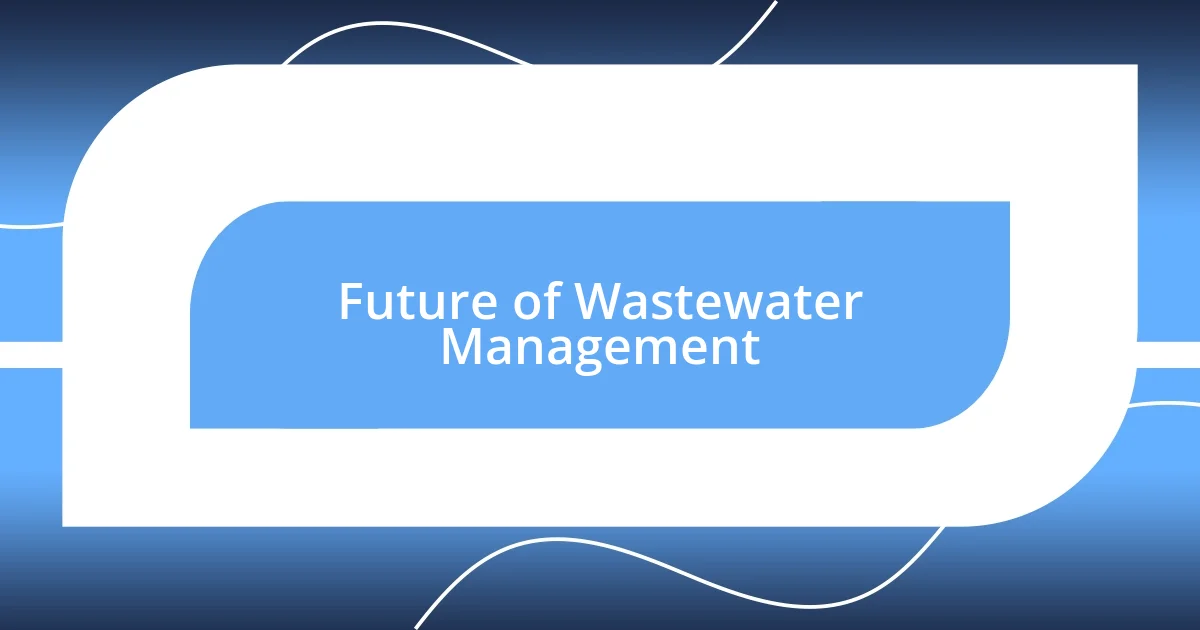
Future of Wastewater Management
As I look toward the future of wastewater management, I can’t help but feel excited about the potential for decentralized systems. When I first learned about the concept, it sparked my imagination—communities taking charge of their water treatment on a local level, using innovative techniques tailored to their specific needs. It might sound idealistic, but seeing places embrace these systems instilled in me hope for a more self-sufficient and resilient future.
Emerging technologies, such as smart sensors and data analytics, also intrigue me. I remember attending a tech fair where I encountered a startup developing software to optimize wastewater treatment processes in real time. It struck me how data-driven solutions could enhance efficiency and reduce costs, transforming how we manage our resources. Who wouldn’t feel empowered knowing they could turn raw data into actionable insights for cleaner water?
Looking ahead, I find the idea of integrating wastewater management into larger urban planning efforts equally compelling. I was on a panel discussing this topic, and it dawned on me how critical it is to treat water management as part of holistic urban design. Imagine vibrant green spaces incorporated with wastewater solutions, not only improving our environment but also our urban ecosystems. Isn’t it astounding to think that wastewater can be a resource rather than just a problem? This shift in perspective could redefine how we interact with our environment on multiple levels.

